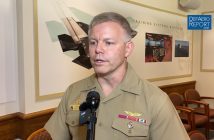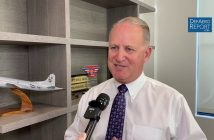Mark Esper, PhD, the 23rd Secretary of the Army, discusses great power competition, talent management, and modernization during an interview with Defense & Aerospace Report Editor Vago Muradian at the 2018 AUSA Annual Meeting in Washington, DC. Our AUSA coverage is brought to you by Bell, a Textron Company, Elbit System of America, L3 Technologies, Leonardo DRS, and Safran.
Click Here for Podcast
Mark Esper, PhD
US Army Secretary
AUSA Annual Meeting
October 2018
Vago Muradian: Welcome to the Defense and Aerospace Report. I’m Vago Muradian here at the Association of the United States Army’s Annual Conference and Trade Show in Washington, DC, the number one gathering of U.S. Army leaders from around the world to talk about the service’s future, its strategy, doctrine, budgets, and technology. Our coverage here is sponsored by Bell, a Textron company; Elbit Systems of America; L3 Technologies; Leonardo DRS; and SAFRAN. And we’re positively honored to have with us the 23rd Secretary of the United States Army, Dr. Mark Esper. Sir, it’s a pleasure seeing you again.
Secretary Mark Esper: Thank you, Vago. Good to see you as well.
Mr. Muradian: We had a great conversation earlier this year. It’s been such a productive year for you and the Chief. The Vision Statement which is two pages, which you probably said, written in clear English, talking about budget challenges, technology challenges, but also the direction of the future force, the establishment of the Futures Command, the first new U.S. Army command since TRADOC and FORSCOM were created in 1973. And then also stripping away hundreds of regulations to make the lives of soldiers easier.
Talk to us. This is a nice opportunity always to reset for the coming year. What are the priorities that you and the Chief are going to have over the next calendar year to deliver just like you guys had a pretty ambitious schedule this year.
Secretary Esper: Well, let me just say, step back first and say that we are in a renaissance, as I mentioned this morning. And our guideposts on this renaissance are readiness and modernization. So there are a number of initiatives we took this year. You mentioned a few of them. I’d also mention making clear that the Army Combat Fitness Test will be our future physical fitness test. We extended Basic Training by two months. You mentioned the Army Vision that was published in June. We stood up Army Futures Command in July.
So task number one I think is implementation. The follow-through piece of this renaissance to make sure all those things continue to progress, continue to move forward, and fulfill our expectations of what each are.
Then I think as we look ahead, there will be other changes down the road, more regulatory relief, more compliance relief, if you will. And as I mentioned this morning also, we are in the process of developing a new talent management base personnel system. That will take some time, much like everything does, but that’s probably the next major milestone that I’d like to accomplish here in the coming year.
Mr. Muradian: Which is extraordinary. We’re going o be talking to General Seamands about that.
But give us a brief description about where you think Army talent management should go. You’re a West Point graduate, you’re a Harvard graduate, you’re a GW graduate, my alma mater, shout out to the Colonials. Talk to us about what you want the Army talent management system of the future to look like as opposed to a system now that basically resides since horse cavalry days.
Secretary Esper: Well, less rigid. More open, more flexible. I’d like to see more of a market-based type of system where individual soldiers — officers, NCOs, enlisted — can speak more to their preferences and we can try and better marry up their preferences with also what we like to say are their knowledge, skills and attributes. So again, more of a market-based system. Much more fluidity with regard to how that system operates so people can enter or leave any component of the service seamlessly. And there are other features like that where we offer many more career paths. We identify multiple definitions of success. And we better manage talent at all levels. Certainly at the captain and above level where we really need to pick our next generation of leaders for the Army.
Mr. Muradian: Speaking of next generation leaders, it’s been 17 years since 9/11 and the U.S. Army has been constantly at war along with the other branches of the military, and yet most of that experience has been a counterinsurgency, counterterrorism mindset. Your generation, you started at West Point in 1982, the height of the Cold War. You graduated in 1986. And your instructors, mentors were World War II generation, Korea, Vietnam, where they were fighting counterinsurgency or different kinds of wars while still maintaining that great power picture in their heads. And some real giants over that period.
What’s the culture shift you and the Chief belief is necessary to get the head of this counterinsurgency, counterterrorism Army into a great power mode? I ran into Bud [Forester] with his nuclear PhD. Folks have a tendency of forgetting that the United States Army had some of the smartest nuclear theory minds in the nation.
Secretary Esper: Well, we’re driven in many ways by the National Defense Strategy which tells us, and rightly so, that we’re now in an era of great power competition. That strategic competitors such as Russia and China will be, could be our foes one day. And so we need to think very differently about how we would fight in an environment where the adversary has high end anti-air capabilities. Something we haven’t faced in the past 17 years. Or where they have heavy mechanized forces. Again, something we haven’t faced in the last couple of years.
So folks from my generation, officers and NCOs from my generation are going to have to step up and really talk to the force about how do we pivot, how do we get back to that high-end fight, that high-end training? Much more demanding. How do we work air defense and electronic warfare and all those capabilities back into our formations and learn to use the entire combined arms team to fight these greater fights? And that’s coming. That’s happening right now.
If you were to go out to the NTC today you would see them training out there, much like they did when I went through in 1987-1988. And that’s good to see. It’s very reassuring. We need to continue along that path.
Mr. Muradian: How do you respond to those folks who say that the Army’s focus in fighting in mega cities is misplaced? That we did it in Raqqa or Mosul or elsewhere with a preponderance of air power to try to minimize U.S. casualties. And as one friend of mine that I ran into down there, a retired general officer, said look, that’s a little bit of folly. We want to avoid that as much as we can.
Why is it so important to have that as sort of a core principle going into both this modernization, but intellectual cycle?
Secretary Esper: Well, we don’t get to pick necessarily where we’re going to fight. The enemy has a vote in that, for one. Secondly, if you look again at what the National Defense Strategy tells us, if we end up fighting a Russia or a China one day, Europe and China is very dense when it comes to cities and places like that. So we need to be prepared to fight in that environment. Not exclusively, but we need to be prepared to fight there in addition to open deserts and open plains, if you will. We’ve got to be able to do it all.
Mr. Muradian: And as you’ve said and we’ve discussed, even island hopping and a number of other things that General Odierno also was working when he was Chief.
Let me take you to the budget. You wisely say in the Vision Statement, look, the budgetary scenario looks uncertain as we’re going forward. Let me ask you for the ’19 priorities. We’re in the beginning of the budget build cycle. I know you can’t presage a lot of specific numbers and things like that. But what are your and the Chief’s priorities going to be going into this budge you want to see in ’19? It’s going to be expected to be another very strong year. Congratulations, by the way, of starting for the first time in a decade with a real budget on the fiscal year which must feel good.
But talk to us about what are some of the foundational principles going to be going into this budget build for you?
Secretary Esper: First let me say thanks to Congress for giving us a budget on time that’s predictable, that’s sufficient. We really appreciate them coming together and delivering that for the Army. It will be key to today’s readiness and tomorrow’s readiness modernization.
What are our priorities? They are exactly those six that we lined out at the beginning of the year when I came on board. Everything from long-range precision fires at the top to soldier lethality at the bottom. And then mixed in there of course are the costs it will take to extend Infantry Basic Training by two months, and to do the same for other branches. Or to implement the Army Combat Fitness Test. Those are our priorities.
At an event like this where you have industry, it’s those six priorities that are guiding us. They are at the top of the list. They will be funded first. So if we see flat or declining budgets in ’20 and beyond, we are set to make sure that we fund the modernization, the future of the Army first.
Mr. Muradian: Do you think given, if you look ’20 and beyond, we’re looking at a flattening if not a decline. Do you think that it’s going to be necessary to do any major muscle movements, for example, block retirement of systems? I know that that’s been discussed. I discussed that with Will Roper, the Air Force Acquisition Chief where he said look, for us to, it may make sense to get rid of old equipment faster in order to underwrite modernization programs. You want a new combat vehicle, the replacement for the Bradley. There’s discussion of a new tank because the M1 tank is not a spring chicken, as capable a vehicle as it is. Can you see block retirement of older systems in order to free up added modernization funding to accelerate certain priorities?
Secretary Esper: I don’t take anything off the table. We just need to, we’ll have to face that when we come to it. But you’ve got to keep in mind that we may be called into action at any time. You go to war with the Army you have. And I can’t necessarily retire entire fleets because who knows when we may be called to defend the nation? So we have to be smart about it, but we have to begin the investment. Which means for a number of years we’ll be doing two things at once. That is maintaining the current fleet so it remains capable, while we grow and build and produce the future fleet. At that point in time we can start managing the risk a whole lot better. But we’ll see. I don’t like to speculate on hypotheticals, but look at all the options. The Chief and I are prepared to make the tough decisions.
Mr. Muradian: Let me ask you about the Futures Command. An absolutely new organization designed to be innovative, agile, all the things that you have spoken about as being priorities for the force. But there’s a bit of uncertainty how the new organization is going to work, how it’s going to interface with Dr. Jette’s acquisition organization. I know that, for example, Lieutenant General Ostrowski is going to serve as sort of a bridging function to an extent. But there are folks who are asking some questions about look, how is this new system going to work? What can you offer folks? You know, you’ve had a number of meetings down here. We’ve arrived either before you’ve arrived or arrived right after you’ve let, and folks have asked that. What have you been telling them in answering that question?
Secretary Esper: Well, I tell everybody what I tell the Army Staff. That we have to be prepared to operate in the grey for a while. There’re always tradeoffs. We’ll learn as we go, and there may be some things that we do today that we undo tomorrow. But I’m very confident that we picked the right guy for the job, General Mike Murray. He’s got the leadership skills, the knowledge of acquisition, the perspective of Washington, DC to really lead that organization, and he’ll have a whole lot of people helping him.
General Ostrowski is still assigned to ASA(ALT). He reports to Dr. Jette. But he has this additional duty to also support General Murray. So I’m confident that all the stuff will be worked out. We have a year for Army Futures Command to be fully operationally capable. We’re only two months into it or so, and over time we will continue to add organizations into the mix, continue to assign, and that also gives us time to work out all the relationships between not just ASA(ALT) the acquisition folks and General Murray, but also between the testing community and the contracting community. All those things that will be baked into Army Futures Command.
Mr. Muradian: How do you respond to those who say look, what’s the rush? They’ve even said that hey, it looks like OSD and the Army aren’t on the same page in terms of the necessity for speed. How do you respond to folks who raise that?
Secretary Esper: I’ve never heard that from OSD. I think if anything, OSD completely agrees with us in terms of the need to be more quick, to be more efficient in terms of how we use our budget and are applauding us and supporting our moves on Army Futures Command.
I would just say that these things take time. We need to be patient. We need to be comfortable with the grey. But I will tell you this much, I know we can’t build the next generation combat vehicle or long-range precision fires or improve soldier lethality with the current system we have. It takes too long. It’s too inefficient. We’ve seen some of the epic failures we’ve had in the past. We have to do something different. And one thing that we’ve heard from either Congress or from expert testimony before Congress, from experts in the think tank community, was putting accountability into the system, having a single person in charge, getting unity of command, unity of effort will go a long way towards vastly improving the Army modernization enterprise.
Mr. Muradian: Let me ask you one last question and that’s on the Army Corps of Engineers. At the behest of the White House the organization is going to lose, and you’ve signed off on the requirement, to get the civil engineering mission out of the force. Talk to us about how that’s going to work because the Army Corps of Engineers is one of history’s greatest engineering organizations, both on the civil side as well as on the military side. Talk to us about how that separation’s going to work to make sure that none of its combat capability, given that some of its civil capability is something that also the force has, the Corps has been able to leverage in the past. How that’s going to work out.
Secretary Esper: Well, we have to see how that all plays out. This was an OMB initiative. The Army supports it. We proposed some options. I’m confident that if that were to move forward Congress needs to approve that. If that were to move forward, that we would have, retain the combat capability of the engineers. But it was more about the civil works function. But like I said, we’ll see. Congress has a big say in that. There are a lot of laws that need to change and what not, but we support the OMB decision going forward and we’ll continue to take guidance that way
Mr. Muradian: Dr. Mark Esper, 23rd Secretary of the United States Army. Sir, it’s always a pleasure. Thanks very much, and I hope you have a great AUSA.
Secretary Esper: Great, thank you very much, Vago.
Mr. Muradian: Hey, and how do you think Army football’s going to do this year in the big Army/Navy game? I know that Air Force —
Secretary Esper: We’ll win again and we’ll keep the Commander in Chief’s Trophy.
Mr. Muradian: Do you have any shout-out you want to give to the Corps of Cadets?
Secretary Esper: Beat Navy and Beat Air Force.
Mr. Muradian: Thanks, sir.
Secretary Esper: Thanks, Vago.
-30-




